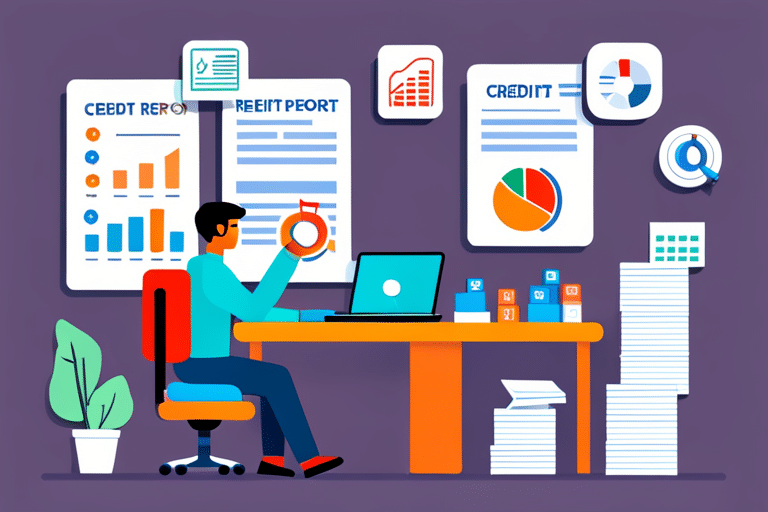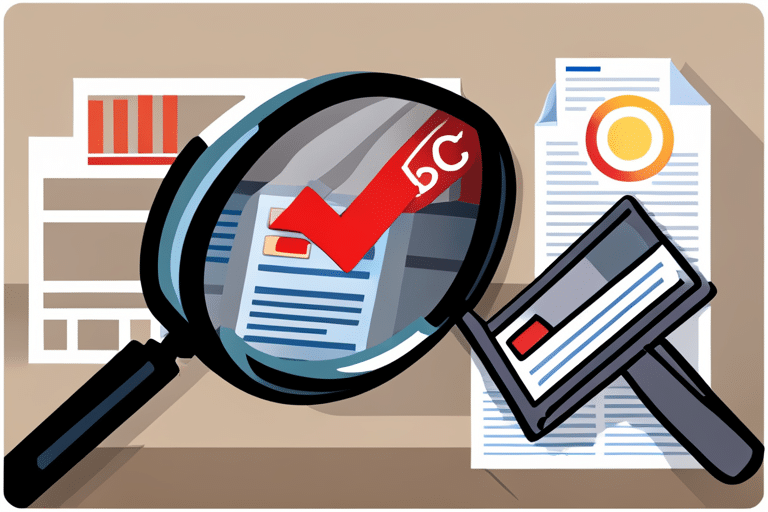Are you ready to take the reins of your financial future and unlock the door to better credit? Well, saddle up, because this step-by-step guide is here to help you boost your credit score with ease.
We’ll be your trusty navigator on this journey, showing you how to understand your credit score, assess your current report, and identify those pesky negative factors holding you back.
So grab a pen and get ready to write yourself a brighter financial future!
Key Takeaways
- Understanding credit scoring models and how they consider various factors is essential for analyzing your credit report and improving your credit score.
- Paying off high-interest debts first, increasing your credit limit, and keeping old accounts open can positively impact your credit score through credit utilization.
- Late payments, high credit card balances, collection accounts, bankruptcy or foreclosure, and too many inquiries can negatively affect your credit score.
- To boost your credit score, create a savings plan, make regular debt payments, use a budget to manage spending, prioritize debts based on interest rates or balance, and consistently stick to your budget and debt repayment plan.
Understanding Your Credit Score

Now that you know why your credit score is important, let’s dive into how it’s calculated and what factors affect it.
Understanding credit scoring models may sound like a snooze fest, but trust me, it’s not as complicated as it seems. Think of it as a secret recipe that determines your financial worthiness. Just like the perfect ratio of sugar to spice in a delicious cake, credit scoring models take various ingredients into account.
One factor that can have an impact on your score is credit inquiries. These occur when you apply for new credit or loans, such as a shiny new credit card or a mortgage for that dream home. Each time you make an inquiry, it sends a signal to the credit bureaus that you’re seeking more debt. Now, I’m not saying inquiries are bad; after all, we all want to achieve our goals and dreams. But too many inquiries within a short period of time can raise red flags and lower your score.
So how does this tie into assessing your current credit report? Well, once you understand the ins and outs of how your score is calculated, you’ll be able to better analyze the information on your report. It’s like having X-ray vision into your financial life!
Assessing Your Current Credit Report

So, you’re ready to dive into the nitty-gritty of your credit report, huh? Well, buckle up because we’re about to uncover some juicy details!
First things first, let’s talk about those pesky credit report errors that can sneak their way onto your file and wreak havoc on your financial life. But don’t worry, we’ve got some tips up our sleeve for improving your credit utilization too – trust us, it’s easier than you think!
Credit Report Errors
First, let’s take a look at how credit report errors can impact your overall credit score. It’s crucial to keep an eye out for any inaccuracies that may be lurking in your credit report. These errors can have a significant impact on your credit score and financial well-being.
So, what should you do if you spot any discrepancies? Here are five steps to follow:
- Dispute the error with the credit bureau.
- Provide supporting documentation to prove your case.
- Keep track of all communications and correspondence.
- Be patient as the investigation process takes time.
- Monitor your credit report regularly to ensure the error is resolved.
Improving Credit Utilization
If you want to improve your credit utilization, start by paying down any outstanding balances on your credit cards. Credit utilization is the percentage of available credit that you are currently using, and it plays a significant role in determining your credit score. The lower your credit utilization, the better it is for your credit score. So, here are a few tips to help you improve your credit utilization:
-
Pay off high-interest debts first: Start by tackling the balances with the highest interest rates to save money in the long run.
-
Increase your credit limit: Request a higher limit on your existing cards or apply for new ones to increase your overall available credit.
-
Keep old accounts open: Closing old accounts can decrease your total available credit and increase your utilization ratio.
By following these tips, you can positively impact your credit utilization and ultimately boost your overall credit score!
| Tips | Impact |
|---|---|
| Pay off high-interest debts first | Decreases overall utilization ratio |
| Increase your credit limit | Increases available credit |
| Keep old accounts open | Maintains higher total available credit |
Identifying Negative Factors Impacting Your Score

To identify negative factors impacting your credit score, take a look at your payment history and outstanding debt. Don’t worry, it’s not as scary as it sounds! We’re here to guide you through the maze of credit scores and help you understand what might be dragging yours down. So grab a cup of coffee (or tea if that’s more your style), sit back, and let’s dive in!
Here are five common credit mistakes that could be hurting your score:
- Late payments: Oops! Life gets busy, but try to stay on top of those due dates.
- High credit card balances: It’s like carrying around a heavy backpack all day – lighten the load by paying off some of that debt.
- Collection accounts: Nobody likes unexpected surprises, especially when they show up on your credit report. Keep an eye out for any collections lurking in the shadows.
- Bankruptcy or foreclosure: Sometimes life throws curveballs, but don’t worry – there are strategies for rebuilding credit after these setbacks.
- Too many inquiries: Did you go on a shopping spree? Credit bureaus might raise an eyebrow if they see too many new applications.
Now that we’ve identified some potential culprits, let’s talk about strategies for rebuilding your credit. Start by making all future payments on time and reducing outstanding debts. Consider creating a budget to keep spending in check and avoid maxing out those credit cards. And remember, patience is key – improving your credit score takes time.
Creating a Budget and Paying Off Debt

Now that you’ve identified those pesky culprits responsible for sabotaging your credit score, it’s time to roll up your sleeves and take control of your finances! Creating a budget and tackling that daunting debt is the next step towards financial freedom. But don’t fret, my friend, I’m here to guide you through this process with ease and a dash of pizzazz.
First things first, let’s talk about creating a savings plan. Saving money may not sound like the most thrilling activity, but trust me, it’s like planting seeds for a bountiful harvest. Start by setting aside a portion of your income each month specifically for savings. This will serve as your safety net when unexpected expenses come knocking on your door.
Now onto developing a debt repayment strategy. Picture yourself as a fearless warrior armed with determination and a spreadsheet in hand. List down all your debts along with their interest rates and minimum monthly payments. Then, prioritize them based on either the highest interest rate or smallest balance – whichever approach makes you feel more victorious!
Next comes the fun part – allocating extra funds towards paying off those debts! Look at areas where you can trim unnecessary expenses (goodbye daily fancy coffee!) and redirect that money towards debt repayment. You’ll be amazed at how much progress you can make by simply cutting back on non-essential spending.
Remember, my dear master of finance, consistency is key when it comes to budgeting and debt repayment. Stick to your plan religiously and celebrate every small victory along the way. Soon enough, you’ll see that credit score soar high into the sky like an eagle spreading its wings.
Establishing a Positive Payment History

Hey, you! Ready to dive into the next step of boosting your credit score? Well, let’s talk about the importance of timely payments and consistent payments.
Trust me, paying on time not only improves your credit but also saves you from those pesky late fees.
Plus, being consistent with your payments shows lenders that you’re responsible and can be trusted with more credit in the future.
Timely Payments Improve Credit
Making consistent and timely payments is a key factor in improving your credit score. It may not be the most thrilling task, but hey, it’s like watering a plant – you gotta do it if you want to see some growth! So, let’s dive into why this matters and how it can impact other aspects of your financial life:
-
Effect on loan applications: A good credit score can open doors to better interest rates and higher chances of approval. Lenders love borrowers who pay on time!
-
Impact on insurance premiums: Believe it or not, your credit score can affect the cost of your insurance premiums. Maintaining a healthy payment history may help keep those costs down.
-
Building trust with lenders: Consistent payments show lenders that you’re reliable and responsible with money. This can lead to future borrowing opportunities at more favorable terms.
-
Confidence boost: Seeing progress in your credit score can give you a sense of achievement and confidence in managing your finances.
-
Financial flexibility: With an improved credit score, you’ll have more options when it comes to obtaining loans or financing for major purchases.
Importance of Consistent Payments
Consistent and timely payments demonstrate financial responsibility and can positively impact your loan applications, insurance premiums, and future borrowing opportunities. It’s like watering a plant – regular nourishment makes it flourish! Let’s break it down in a fun way with a table:
| Consistent Payment Benefits | Insurance Premiums |
|---|---|
| Higher credit score | Lower rates |
| Increased borrowing power | More coverage |
| Better loan terms | Peace of mind |
See how consistent payments can be the secret sauce to financial success? When you consistently pay your bills on time, lenders see you as reliable and trustworthy. This builds up your payment history, which is a major factor in determining your creditworthiness. So keep those payments coming in regularly, and watch as doors open to better loans, lower insurance premiums, and more opportunities for borrowing. You’ve got this!
Using Credit Wisely and Avoiding Excessive Debt

Using credit wisely and avoiding excessive debt is crucial for improving your credit score. It’s like walking a tightrope, my friend. You want to use your credit cards to build a positive credit history, but you also need to avoid falling into the pit of overwhelming debt.
Here are some tips to help you manage your credit card debt and use your cards responsibly:
-
Stick to a budget: Create a monthly spending plan and stick to it like glue. This will help you avoid overspending and racking up unnecessary debt.
-
Pay on time, every time: Late payments can have a negative impact on your credit score faster than an ostrich with its head in the sand! Set up automatic payments or set reminders so you never miss a due date.
-
Keep balances low: Try not to max out your credit cards, as this can hurt your credit utilization ratio. Aim to keep your balances below 30% of your available credit limit.
-
Don’t close old accounts: Even if you’re not using them anymore, keeping old accounts open can actually work in your favor by increasing the average age of your accounts.
-
Avoid cash advances like the plague: These babies come with high interest rates and fees that could make even Scrooge McDuck shed a tear.
Monitoring Your Credit Report Regularly

To stay on top of your credit health, it’s important to regularly monitor your credit report for any potential errors or fraudulent activity. Think of it as giving your credit score a check-up, just like you would with your physical health. By keeping a close eye on your credit report, you can catch any issues early and take the necessary steps to resolve them. Plus, monitoring your credit report can also help you identify areas where you can improve your credit score.
One effective way to monitor your credit is by using a reputable credit monitoring service. These services keep an eye on your credit report and notify you of any changes or suspicious activity. It’s like having a personal bodyguard for your financial well-being! They provide real-time updates and alerts, so you never miss a beat when it comes to the state of your credit.
In addition to using a monitoring service, there are other strategies you can implement to improve and maintain a healthy credit score. Take a look at this handy table below for some helpful tips:
| Credit Monitoring Tips | Credit Score Improvement Strategies |
|---|---|
| Regularly check | Pay all bills on time |
| yourcreditreport | Keep balances low |
| Limit new applications | |
| Diversify types of credit |
As you can see, staying vigilant with monitoring yourcreditreport is just one piece of the puzzle in boostingyourcreditscore. By incorporating these strategies intoyourfinancial routine, you’ll be well onyourwaytoachievingcreditmastery! So go ahead, give yourself that financial check-up and watch asyourcreditscore rises to new heights!
Disputing Errors on Your Credit Report

If you find any errors on your credit report, it’s crucial to dispute them promptly in order to protect your financial well-being. Your credit report is like a window into your financial world, and inaccuracies can cloud that view. But fear not! Correcting these mistakes is easier than you think.
Here are five steps to help you dispute charges and set things right:
-
Gather your evidence: Start by collecting all the supporting documents that prove the error. This could be anything from payment receipts to bank statements. Get ready to unleash the power of paperwork!
-
Draft a letter: Put on your writer’s hat and compose a formal letter explaining the mistake and providing evidence of its inaccuracy. Be clear, concise, and polite – remember, you’re aiming for mastery here.
-
Send it off: Once your letter is complete, send it via certified mail with a return receipt requested. This ensures that there’s proof of delivery should any disputes arise later on.
-
Follow up diligently: Check in with the credit reporting agency after about 30 days to see if they’ve taken action on your dispute. Persistence pays off!
-
Keep tabs on your progress: While waiting for resolution, keep an eye on your credit report regularly. You may need to provide additional information or follow up if necessary.
Disputing errors on your credit report might sound daunting at first, but armed with these steps, you’ll be able to tackle it head-on! So go forth and protect that precious financial reputation of yours!
Utilizing Credit Building Strategies

Hey there, credit builder extraordinaire!
Today we’re diving into some key points that are going to help you level up your credit score game.
First up, let’s talk about the importance of your payment history. It’s like the backbone of your creditworthiness and can make or break your score.
Next, we’ll tackle the credit utilization ratio – a fancy term for how much of your available credit you’re actually using. Keeping this ratio low is a surefire way to impress those lenders.
Lastly, we’ll explore the art of building a diverse credit mix – because variety is not just the spice of life, it’s also what makes lenders swoon over your financial prowess.
Get ready to take control of your credit destiny!
Payment History Importance
Having a consistent payment history is essential for improving your credit score. It’s like the foundation of a house – without it, everything else crumbles. So, let’s dive into why your payment history impacts your credit score and how it’s calculated:
-
On-time payments: Paying your bills on time shows responsibility and reliability. Keep those due dates in check!
-
Late payments: Oops! Late payments can lower your credit score because they signal potential financial instability.
-
Missed payments: Yikes! Missing payments altogether can have a significant negative impact on your credit score.
-
Payment frequency: Regularly making payments helps build a positive payment history over time.
-
Payment amount: The more you pay towards your debts, the better it reflects on your creditworthiness.
Credit Utilization Ratio
To improve your creditworthiness, it’s important to keep your credit utilization ratio low by using only a small portion of your available credit. Think of it like this: imagine you have a pizza and you only take a tiny slice. That way, you still have most of the pizza left for later! The same goes for your credit. By using only a small portion of your available credit, you show lenders that you’re responsible with your borrowing.
Aim to keep your credit utilization below 30%. If possible, pay off your balances in full each month to really impress the lenders. Remember, high credit utilization can negatively impact your credit score, so be mindful of how much you’re charging on those cards!
Now that we’ve got the hang of managing our credit utilization ratio, let’s move on to building a diverse credit mix…
Building Diverse Credit Mix
Building a diverse credit mix is crucial for improving your creditworthiness and demonstrating to lenders that you can handle different types of credit responsibly. It’s like creating a buffet of financial options that shows you’re not just a one-trick pony when it comes to managing your money!
So, let’s spice up your credit history by adding some variety to the mix. Here are five tantalizing ways to build your credit:
-
Add a mix of credit cards: Get yourself a couple of different types of credit cards, like a rewards card and a low-interest card.
-
Explore installment loans: Consider taking out an auto loan or personal loan to diversify your credit portfolio.
-
Get cozy with retail accounts: Open store-specific accounts and show off your responsible spending habits.
-
Become friends with secured credit cards: These babies require collateral but can help you establish or rebuild your credit.
-
Don’t forget about student loans: If you have them, make sure they’re included in the delicious medley that is your diverse credit mix.
Now go forth and conquer the world of building an impressive (and tasty) credit history!
Patience and Persistence: Maintaining a Good Credit Score

Maintaining a good credit score requires patience and persistence. It’s like taking care of a delicate plant; you can’t just water it once and expect it to flourish. No, my friend, you need to nurture it consistently.
One way to do this is by maintaining your credit limit. Think of your credit limit as the maximum amount you can borrow without getting into trouble. It’s like having a safety net that prevents you from falling into the abyss of debt. So, be mindful of how much you charge on your credit cards and try to keep your balance below the limit.
Another aspect of maintaining a good credit score is understanding the credit score timeframe. Your payment history plays a significant role in determining your creditworthiness, so make sure you pay your bills on time, every time. Late payments can have a negative impact on your score, so set up reminders or automatic payments to ensure you stay on track.
But here’s the thing – building and maintaining a good credit score takes time. Rome wasn’t built in a day, and neither will your stellar credit history magically appear overnight. Be patient with yourself and trust the process. Keep practicing good financial habits, such as paying off debt and using credit responsibly.
Frequently Asked Questions
Can I Boost My Credit Score Overnight?
You can’t boost your credit score overnight, but don’t worry! There are quick credit fixes and steps you can take to start building your credit history. It takes time and patience, but you’ll get there!
Will Closing Old Credit Card Accounts Improve My Credit Score?
Closing old credit card accounts may not improve your credit score. Your credit utilization ratio could increase, which might negatively impact your score. It’s important to understand the potential consequences before making any decisions.
Can I Pay Someone to Improve My Credit Score for Me?
No, you can’t pay someone to magically boost your credit score for you. Hiring professionals or credit repair services may help, but ultimately improving your credit score requires time and effort on your part.
How Long Does It Take for Negative Information to Be Removed From My Credit Report?
Hey, did you know that negative information can stick around on your credit report for up to seven years? But don’t worry! By focusing on positive habits and staying patient, you can bounce back and boost your credit score in no time.
Will Getting a Higher Income Automatically Improve My Credit Score?
Getting a higher income won’t automatically improve your credit score. While it can help, other factors like payment history, credit utilization, and length of credit history play a bigger role in boosting your score.
Conclusion
Congrats, you credit-boosting superstar!
You’ve just conquered the art of improving your credit score.
By understanding and assessing your current situation, paying off debt, establishing a positive payment history, and staying vigilant with monitoring and disputing errors on your credit report, you’ve leveled up like a pro.
So, are you ready to enjoy all the perks that come with a stellar credit score?
Go ahead and treat yourself to that dream vacation or shiny new gadget – you deserve it!

